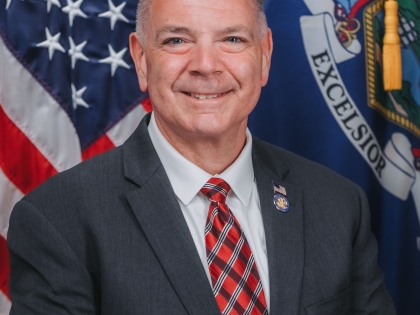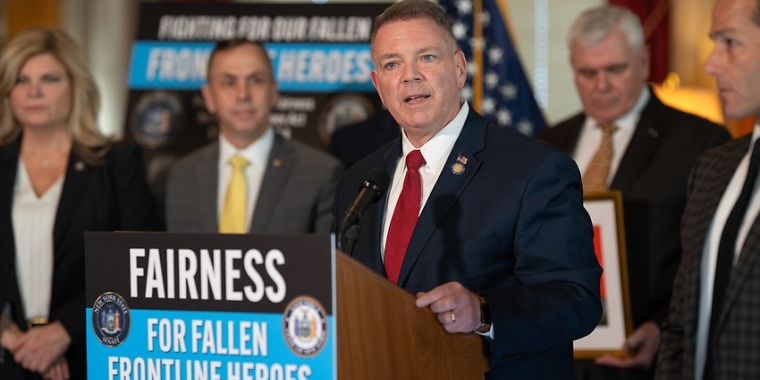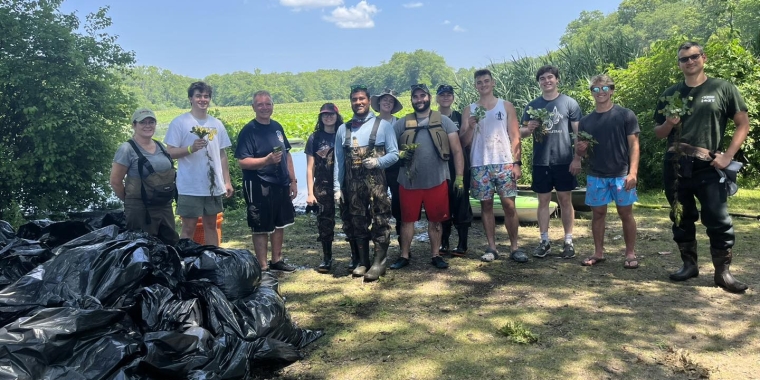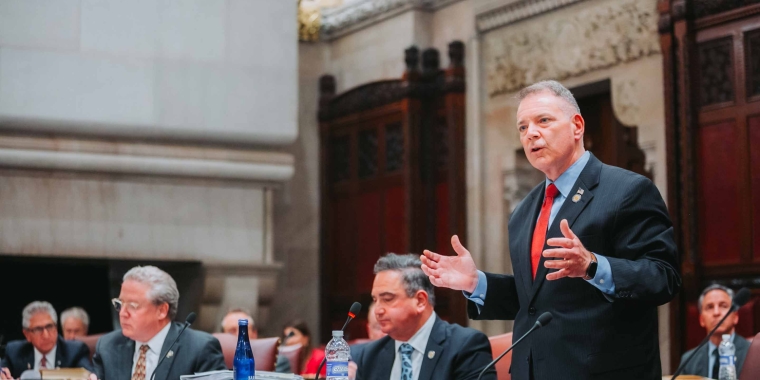
Senator Rhoads & Assemblyman Durso Announce Fletcher Fairness for Frontline Heroes Act
February 7, 2024

On February 5, New York State Senator Steve Rhoads and Assemblyman Michael Durso announced their bill S.7792-A/A.8408-A that will enact the "Joseph Fletcher Act" to permit certain claims by essential employees for compensation based on death due to COVID-19 which were previously denied or not timely filed. The legislators were joined by large coalition of State Senators and Assembly Members, union leaders from Nassau County PBA, Suffolk PBA, MTA PBA, the Police Conference of New York, as well as Zoey Laskaris, PhD, Research Assistant Professor at Barry Commoner Center Queens College CUNY, Christine Obernauer the Executive Director of the New York Committee for Occupational Safety and Health (NYCOSH), and Veronica Fletcher, the widow of Joseph Fletcher.
Joseph Fletcher worked for the MTA for over 17 years. He was based at the Flatbush Bus Depot. While working, he became very sick with COVID at the start of the COVID-19 pandemic and on April 11, 2020, ten days after going on a respirator, Joseph passed away. He was 60-years-old. His wife, Veronica, and three children could not give him a funeral because of the COVID-19 restrictions. Because they had been exposed, they could not even comfort each other with hugs. Joseph Fletcher was the sole breadwinner for his family and after he died, his family had to visit food pantries to keep food on the table.
A study appearing in the Journal of Occupational and Environmental Medicine finds that while 87% of COVID-19 claims were for essential workers, of the 6,321 COVID-19 related deaths, only 2% resulted in a claim for death benefits under the Workers Compensation Law in 2020 and 2021. This suggests that the number of work-related death claims was significantly underreported and that the number of claims for death benefits actually filed by surviving family members of essential workers bears no relationship to the number of eligible families. These families are presently ineligible for death benefits due to the requirement that such a claim be brought within two years of death. This disparity can be caused by several factors including, but not limited to unfamiliarity with the eligibility for death benefits or whom to contact to seek those benefits; the failure of employers to properly advise surviving families of their ability to file for such benefits; language barriers and the overwhelming grief of sudden loss of a provider in the midst of a global pandemic. This bill provides families with one additional year from the date signed into law to file a claim for death benefits to which they would otherwise be entitled.
These essential workers were true heroes who were asked to put themselves in harm's way to provide essential services to their communities. From healthcare workers and first responders to grocery store employees and delivery drivers, these individuals showed up to work every day despite the risks and challenges posed by the pandemic. They worked tirelessly and often without proper protective equipment, facing the threat of contracting the virus and potentially bringing it home to their loved ones. Their dedication and sacrifice should never be forgotten. These workers were not just numbers or statistics, they were real people with families, friends, and loved ones who are now left grieving their personal loss as well as the reality of a loss of income to their family. Their deaths underscore the need for the passage of this bill and the need for fairness for the families of these fallen frontline heroes.
“I have been a volunteer firefighter for the last 31 years and one of the things I have always done is fight for our first responders—the brave men and women who put themselves at risk to try and protect and save others. When it came to COVID, there were other first responders and frontline heroes like construction workers, transit workers, sanitation workers, grocery workers, and health care professionals who we asked - while the whole world was shut down - to go to work and do their jobs. Joseph Fletcher was one of those frontline heroes. They put their lives at risk, so we consider them to be as much Frontline Hometown Heroes as we do our police, firefighters, EMS personnel and that was the impetus for this bill. It’s about righting a wrong for individuals who put their lives on the line to keep us safe and making the families who are left behind, like the family of Joseph Fletcher, whole and giving them the chance to access the benefits that they were entitled to if they had only known about them—that's fairness for our Frontline Heroes. I look forward to working with my colleagues in the State Senate and Assembly to pass this bill and ensure fairness for our fallen frontline heroes and justice for the families ravaged by the COVID-19 pandemic,” said Senator Steve Rhoads.
“This bill is very simple. It rights a wrong,” said Assemblyman Michael Durso. “We demanded that our essential workers put themselves in harms way, and in some cases lost their lives, in order to take care of us and our loved ones, and keep our state and economy running. Now it is our responsibility to take care of their families who morally deserve this compensation.”
“My husband, Joseph Fletcher, valiantly went into the trenches with his brothers and sisters in the MTA, along with his co-laborers, other essential workers, and First Responders to fight an intangible enemy called COVID that waged war on our City, State, Country and the world. Joseph sacrificed his life so that other people in New York City could continue living and saving lives because during the lockdown transit literally kept the city moving. The first COVID death in New York State I believe was on March 14, 2020. Despite the grim news reports and terrifying images across the globe, my late husband like thousands of other essential workers was committed to answering his call of duty and went into work where he contracted COVID. Joseph went into the hospital and was intubated 18 after that very first death and my husband came out of the hospital 11 days after entering in a body bag. We celebrate and thank our heroic essential workers who survived and are healthy as well as we support those essential workers who have hidden battle wounds. We memorialize our heroic essential workers who perished in the line of duty. Upon enactment, the Joseph Fletcher bill will address what remains—the families of the heroic fallen. The widowed spouses and orphan children of essential workers lost more than our matriarchs, patriarchs, and spouses, we lost stability, we lost resources, and most especially we lost unconditional love because they were our own Heroes all the time and in many cases we did not know what benefits we were even entitled to receive. We were just trying to survive. Joseph Fletcher came to this country from Grenada to live the American dream; Joseph Fletcher sacrificed his life in New York City to help others to continue their American Dreams and with the enactment of the Joseph Fletcher Act his legacy of love and sacrifice will both honor every other essential worker who paid the ultimate price for his or her life and take care of those who remain,” said Veronica Fletcher (Widow of Joseph Fletcher).
To watch the full press conference, please use the link below:
https://www.youtube.com/watch?v=7CMBrwhkFXM



